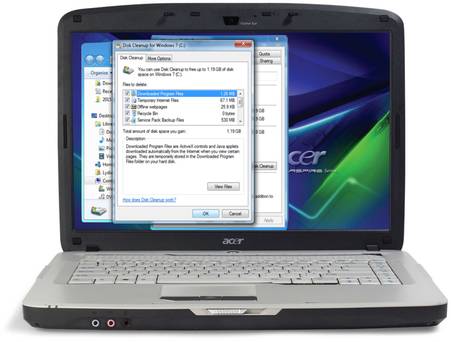Question: I’m an old-aged pensioner and like reading the papers every morning. I have an Acer Aspire 5310 using Windows 7. The laptop works fine as far as I can see. But there’s one thing driving me mad. Waiting for the cache, it takes ages loading a page and I sometimes just give up. I’ve got no one to help and I only learned to use a laptop in the last couple of years. It’s my eyes to the outside world as I live in the countryside. Maybe my laptop is too old as I got it second hand. So if you can help in any way, I would appreciate it as I can’t afford to buy one.
Please log in or register with Independent.ie for free access to this article.
Log In
New to Independent.ie? Create an account
– JM Barry, via email
Answer: There are some things you can use to try and improve a laptop that is now impossibly slow, whether due to cache problems or other issues.
To be honest, they do require some fiddling around. So if you’d rather eat a raw onion than cycle through lists of Windows menus and troubleshoot them when nothing appears to be happening, I’d think carefully about embarking on this course. (And skip the next few paragraphs to get to an alternative solution.)
On the other hand, if you don’t mind having a go, there are one or two potential ways of trying to tackle a troublesome cache.
You can do a basic job of cleaning out your laptop’s cache on Windows 7. One action that will help is ‘disk cleanup’. Click your Start menu and type in ‘disk cleanup’ into the search box and it should come up. It may ask you then to specify what disks or parts of your computer you want to clean up: you should tick as many areas as you can. It should then double check with you whether you want to ‘delete files’, meaning the bits and bobs it has found that the laptop system doesn’t really need or which are slowing things down. Click on this and you may see an improvement.
There are a few other ways of tackling an overburdened cache, both by getting more technical with your laptop (such as entering .exe commands, which almost no one who owns a Windows laptop is really comfortable doing) or by downloading a piece of software that might help you along. This latter action, for you, is a bit of a Catch-22 as, from what you describe, your laptop is now crippled from the cache and it might literally take you hours to complete such a process.
It is obviously possible to get a laptop repair person to look at your machine. The only problem with this is that they will almost certainly charge you over €50 (and very likely over €100) to analyse it and perform some remedial action. You’ll still have an old laptop that will get gummed up again soon and you’ll have spent up to half the cost of a new budget laptop in the process (see below for typical prices and models for some ultra-budget laptops that could do the job fairly well).
Regardless of how you decide to proceed, you should know that your Windows 7 operating system is coming to the end of its life, meaning that Microsoft soon won’t provide any security or virus support for it. The actual date Microsoft has for its end-of-support-for-Windows 7 is January 14, 2020. So if you use your laptop to browse the internet (as 99pc of people do), be careful – if your laptop uses Windows 7, it will be more vulnerable to security risks. Some of the malware that might slip through may not seek to get into your bank account, but will slow your machine down even more.
I know you say you can’t afford a new laptop and this is fair enough. However, if you find a few euro between now and January, it’s a good time to switch. And just to be clear, laptops don’t all cost €1,000, or even €500. A basic €250 laptop from 2019 will do the job your current Acer Aspire 5310 (which is an eight-year-old machine specification, an eternity in laptop years) is doing at a much faster pace and without the same interruptions.
For example, you can get a 14-inch HP Stream laptop with Windows 10 for €279 in Currys. It has very modest storage, graphics and muscle-power but it will definitely get you online with no fuss on a tight budget.
Alternatively, if most of what you use your laptop for is web browsing, news or social media, you could also consider a Chromebook.
These are very inexpensive, very practical laptops that are trimmed down to focus on being internet access laptops rather than also having lots of extra features.
They typically cost around €300 with many brands (HP, Acer, Dell, Asus) making them. But some are even cheaper. For example, there is a 16-inch Asus model on sale right now at PC World for €180. It’s basic, but it works and it won’t give you cache headaches.
I apologise if this latter course of action – replacing your old misfiring machine with a new budget one – isn’t exactly the answer you wanted. But I can guarantee you that even you find a way to paper over this crack, your laptop likely isn’t long for this world.
Recommendation: HP Stream 14 (€279 from Currys)
Email your questions to [email protected]
Source: Read Full Article
